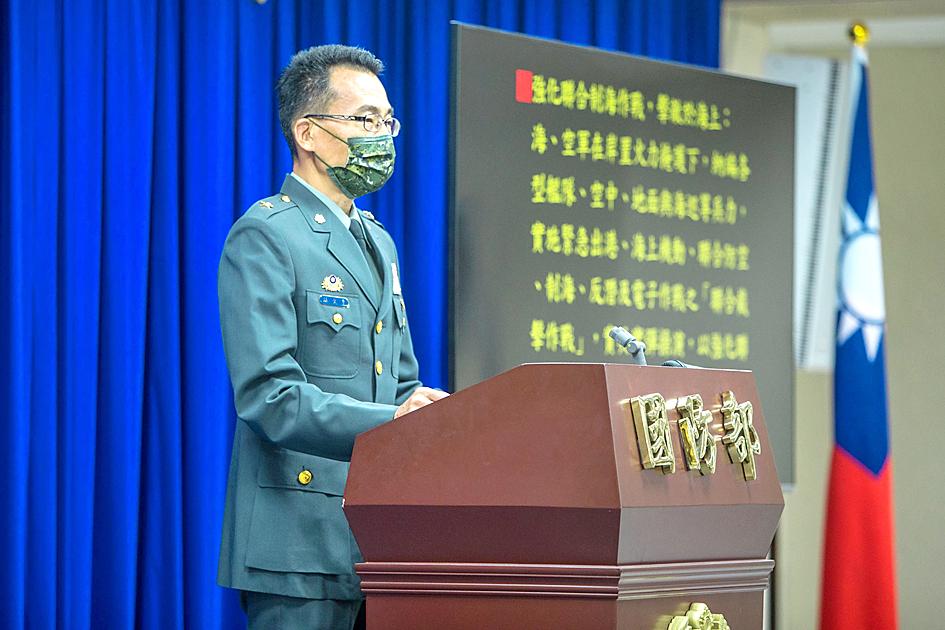The annual Han Kuang military exercises are to begin today with tabletop wargames to test defense strategies against possible Chinese invasion scenarios, the Ministry of National Defense said yesterday.
Unlike previous editions, this year’s wargames would not feature computer simulations and would instead involve physical maps, the ministry said.
The computerized format was dropped because physical maps allow generals to meet face-to-face to discuss strategy and brainstorm ides, a military source said.

Photo courtesy of the Ministry of National Defense
In this way, top-level military officials can better come up with an understanding and reach consensus on defensive strategies, which would be beneficial to the planning of overall military operations, the source said.
Furthermore, unlike computerized wargames, which involve large numbers of personnel from military branches, tabletop wargames only feature a small number of senior military personnel and their staff, the source said, adding that it is a better option given a local COVID-19 outbreak.
The wargames are to run until Friday. They comprise the first phase of the two-part exercise that is held in two stages, the latter being live-fire drills, which are to be held from July 25 to 29 at military drill grounds nationwide.
The annual exercises, first held in 1984, are the nation’s largest military exercises involving all branches of the armed forces and designed to test the country’s combat readiness in the event of a Chinese invasion.
This year’s edition would also incorporate lessons from Russia’s invasion of Ukraine to sharpen combat readiness against a Chinese invasion, the ministry has said.
They are to focus on testing the military’s asymmetrical warfare capability, its ability to wage cognitive warfare and mobilize reserve forces, as well as its overall defense readiness by incorporating civilians, said Major General Lin Wen-huang (林文皇), who is in charge of combat and planning affairs at the ministry.

Taiwan is stepping up plans to create self-sufficient supply chains for combat drones and increase foreign orders from the US to counter China’s numerical superiority, a defense official said on Saturday. Commenting on condition of anonymity, the official said the nation’s armed forces are in agreement with US Admiral Samuel Paparo’s assessment that Taiwan’s military must be prepared to turn the nation’s waters into a “hellscape” for the Chinese People’s Liberation Army (PLA). Paparo, the commander of the US Indo-Pacific Command, reiterated the concept during a Congressional hearing in Washington on Wednesday. He first coined the term in a security conference last

Prosecutors today declined to say who was questioned regarding alleged forgery on petitions to recall Democratic Progressive Party (DPP) legislators, after Chinese-language media earlier reported that members of the Chinese Nationalist Party (KMT) Youth League were brought in for questioning. The Ministry of Justice Investigation Bureau confirmed that two people had been questioned, but did not disclose any further information about the ongoing investigation. KMT Youth League members Lee Hsiao-liang (李孝亮) and Liu Szu-yin (劉思吟) — who are leading the effort to recall DPP caucus chief executive Rosalia Wu (吳思瑤) and Legislator Wu Pei-yi (吳沛憶) — both posted on Facebook saying: “I

The Ministry of Economic Affairs has fined Taobao NT$1.2 million (US$36,912) for advertisements that exceed its approved business scope, requiring the Chinese e-commerce platform to make corrections in the first half of this year or its license may be revoked. Lawmakers have called for stricter enforcement of Chinese e-commerce platforms and measures to prevent China from laundering its goods through Taiwan in response to US President Donald Trump’s heavy tariffs on China. The Legislative Yuan’s Finance Committee met today to discuss policies to prevent China from dumping goods in Taiwan, inviting government agencies to report. Democratic Progressive Party Legislator Kuo Kuo-wen (郭國文) said

Sung Chien-liang (宋建樑), who led efforts to recall Democratic Progressive Party (DPP) Legislator Lee Kun-cheng (李坤城), was released on bail of NT$80,000 today amid outcry over his decision to wear a Nazi armband to questioning the night before. Sung arrived at the New Taipei District Prosecutors’ Office for questioning in a recall petition forgery case last night wearing a red armband bearing a swastika, carrying a copy of Adolf Hitler’s Mein Kampf and giving a Nazi salute. Sung left the building at 1:15am without the armband and covering the book with his coat. Lee said today that this is a serious